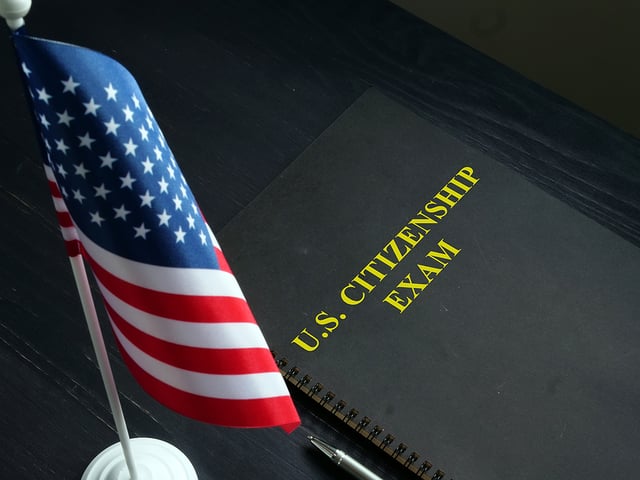
How to Do Well on the U.S. Citizenship Test
If you’re on the path to becoming a U.S. citizen, one important step you’ll need to take is passing the U.S. Citizenship test, also known as the U.S. Naturalization test. While the prospect of this test might seem intimidating, thorough preparation can significantly increase your chances of success. This article aims to guide you through the specifics of the test and offer tips on how to ace it.
Understanding the U.S. Citizenship Test
Passing the U.S. Citizenship Test requires an understanding of both the English and Civics portions of the test. Here’s a more detailed look at each section to give you a comprehensive understanding of what you need to prepare for.
English Test
Speaking Test
The speaking portion of the test is integrated into your eligibility interview with a USCIS officer. Your ability to understand and respond to the officer’s questions, as well as your general conversation skills, are evaluated during this interview. The officer will guide the conversation and assess your understanding of common words and phrases.
Reading Test
For the reading portion of the test, the USCIS officer will provide you with three sentences, and you will be required to read one of them out loud correctly. The sentences are typically based on simple vocabulary and civic-related content. The main aim here is to assess your ability to read and comprehend the English language.
Writing Test
Similar to the reading test, the USCIS officer will ask you to write one out of three sentences correctly. This exercise is to assess your understanding of written English and the ability to construct sentences correctly.
To do well in the English Test, it’s essential to practice speaking, reading, and writing English daily. Resources for learning and improving your English skills are readily available online and in most communities.
Civics Test
The Civics test is designed to evaluate your knowledge and understanding of U.S. history, government structure, and fundamental civic principles. This test is conducted orally, and the USCIS officer will ask you up to 10 questions from a list of 100. You are expected to answer at least 6 out of these 10 questions correctly to pass. It’s important to note that the test is not a multiple-choice format; you need to provide the answers orally, and they need to be accurate to be counted as correct.
These questions touch on a variety of topics, including the U.S. Constitution, the structure of government, U.S. history, and rights and responsibilities of U.S. citizens. It’s recommended to study and understand the context behind each question rather than simply memorizing the answers. Understanding will help you recall the information more easily and allow you to respond more confidently during the test.
Eligibility Criteria for the U.S. Citizenship Test
The eligibility criteria for the U.S. Citizenship Test serve as a filter to ensure that those who seek to become U.S. citizens are adequately prepared for the responsibilities and privileges that come with citizenship. Here’s a deeper dive into each of these criteria:
Age Requirement
To apply for naturalization, an applicant must be at least 18 years old when filing Form N-400, Application for Naturalization. This age requirement aligns with many other legal age thresholds in the U.S., recognizing the person’s legal ability to make a mature decision about citizenship.
Permanent Residency Status
Having a status as a lawful permanent resident (Green Card holder) for at least five years is essential. The five-year requirement is in place to ensure that the applicant has spent a substantial amount of time living in the U.S., allowing them to become acquainted with the country’s laws, culture, and values.
Local Residency Requirement
Applicants must demonstrate at least three months of residence in the state or USCIS district where they apply for citizenship. This requirement ensures that applicants have a real and tangible connection to the local area where they seek to become a citizen, reinforcing the community aspect of citizenship.
Continuous Residence Requirement
Applicants must also demonstrate continuous residence in the U.S. for at least five years immediately preceding the date of filing Form N-400. The continuous residence requirement ensures the applicant’s sustained commitment to the U.S., affirming they haven’t abandoned their permanent resident status.
Physical Presence Requirement
The requirement of being physically present in the U.S. for at least 30 months out of the five years immediately preceding the date of filing Form N-400 is a quantitative measure to ensure substantial presence in the U.S. This aids in the assimilation of the applicant into U.S. society.
English Language Proficiency
The ability to read, write, and speak basic English is another crucial requirement. English is the de facto national language of the U.S., and basic proficiency in it is essential for communication, access to information, and full participation in civic life in the country.
Understanding of U.S. Civics
Applicants should have a basic understanding of U.S. history and government (civics). This requirement ensures that prospective citizens are knowledgeable about the democratic principles, government structure, and historical events that shape the United States. It signifies the importance of an informed citizenry in maintaining a functioning democratic society.
Good Moral Character
Finally, an applicant must demonstrate that they are a person of good moral character, attached to the principles of the U.S. Constitution, and well-disposed to the good order and happiness of the U.S. during all relevant periods under the law. This requirement ensures that those who seek U.S. citizenship are of good standing, respect the rights and freedoms of others, uphold the principles of the Constitution, and contribute to a harmonious society.
By meeting all these eligibility requirements, applicants demonstrate their readiness to take the U.S. Citizenship Test and fully embrace the responsibilities and rights of being a U.S. citizen.
Scoring Details for the U.S. Citizenship Test
Understanding the scoring system for the U.S. Citizenship Test can help you focus your preparation efforts and reduce any anxiety about the process. Let’s delve deeper into how the English language and Civics components of the test are scored.
English Language Test Scoring
The English language test is integrated into your eligibility interview with a USCIS officer and divided into three main parts: speaking, reading, and writing. Each part is evaluated independently, and there’s no numerical scoring system. Instead, you’re assessed on your ability to effectively communicate in English.
Speaking
The speaking test is less of a test and more of an ongoing evaluation during your interview. The USCIS officer assesses your English-speaking skills based on your responses to their questions and your general conversational ability. Your command over the language, understanding of common phrases, and ability to respond coherently to questions in English are key factors.
Reading
For the reading test, you’ll be presented with three sentences and asked to read one of them out loud correctly. If you succeed in accurately reading one of the sentences, you pass this section. The sentences used in this portion typically involve civic vocabulary, which allows for the simultaneous testing of your English reading skills and civic knowledge.
Writing
In the writing section, you’re asked to write one out of three sentences correctly. This exercise tests your ability to construct grammatically correct sentences in English. Like the reading test, if you write one sentence correctly, you pass this part.
Civics Test Scoring
The Civics test is more straightforwardly scored than the English test. In this oral test, the USCIS officer asks you ten questions from a predefined list of 100 potential questions. Your task is to answer these questions to the best of your knowledge.
To pass, you must answer at least six out of the ten questions correctly. The test concludes as soon as you answer six questions correctly, even if you have not yet been asked all ten questions. If you answer incorrectly, the officer will continue to ask you the remaining questions until you have answered six correctly or exhausted all ten questions.
It’s worth noting that you need to respond accurately to the questions based on the official answers provided in the USCIS study materials. Variations in responses may be accepted as long as they are essentially correct and convey a similar meaning to the official answers.
Remember, the U.S. Citizenship Test is not about achieving a perfect score, but rather demonstrating your understanding and knowledge of English and U.S. civics to a satisfactory level. With diligent preparation and practice, you can meet these requirements and be well on your way to becoming a U.S. citizen.
Tips for Doing Well on the U.S. Citizenship Test
Mastering the U.S. Citizenship Test is about thorough preparation and strategy. To maximize your performance on the test, follow these comprehensive tips:
Studying Effectively
The U.S. Citizenship and Immigration Services (USCIS) provides a wealth of resources to help applicants prepare for both the English and Civics components of the test. Take full advantage of these study materials, which include study guides, flashcards, and official lists of test questions.
For the Civics test, aim to understand the concepts behind each question rather than merely memorizing the answers. It’s crucial to understand the context and reasons behind each fact, which can help make the information stick and make it easier for you to recall during the test.
Practicing English Daily
Enhancing your English language skills is critical for doing well on the English test, but it also significantly helps with the Civics portion. The better your English skills, the easier it will be for you to understand the Civics questions and articulate your answers effectively.
There are several ways you can practice and improve your English skills. Consider using language learning apps, enrolling in an English language course, joining a language exchange program, or finding a conversation partner who is a native English speaker. Practicing English in a real-world context can help improve your fluency and comprehension, which will serve you well during your test.
Taking Online Practice Tests
Many online platforms offer practice tests for the U.S. Citizenship Test. These practice tests often mimic the format and content of the actual test, giving you an excellent opportunity to familiarize yourself with what to expect. Regularly taking these tests can help you gauge your progress, identify areas you need to focus on, and build your confidence.
Staying Updated with U.S. News and Government
Frequent engagement with U.S. news and governmental updates is an excellent way to supplement your study materials and apply what you’re learning in real-time. This practice not only helps you understand the relevance of the Civics test content but also helps you feel more connected to the country you aim to call home.
Maintaining Calm and Composure
While it’s entirely normal to feel nervous before a test, maintaining your calm can significantly improve your performance. Anxiety can hinder your ability to recall information and articulate your thoughts. To combat this, ensure you get a good night’s sleep before the test, eat a healthy meal, and engage in calming activities, such as deep breathing exercises or light physical activity, before starting the test.
Conclusion
Achieving success on the U.S. Citizenship Test is absolutely possible with the right preparation and mindset. Remember, it’s not purely about rote memorization. A deep understanding of U.S. history, government, and the English language is key to your success. Utilize all the resources available, prepare diligently, practice frequently, and approach the test with confidence. Your path to becoming a U.S. citizen is well within reach. Good luck on your journey!
Keep Reading

The Naturalization Interview and Tests Blog
Writing on the U.S. Citizenship Test
Applying to be a U.S. citizen is a long and complex journey. By the tim…

The Naturalization Interview and Tests Blog
Reading on the U.S. Citizenship Test
The U.S. Naturalization (or Citizenship) Test is made up of three secti…

The Naturalization Interview and Tests Blog
Are You a Good Candidate for the U.S. Citizenship Test?
Many immigrants hoping to become citizens of the United States apply to…